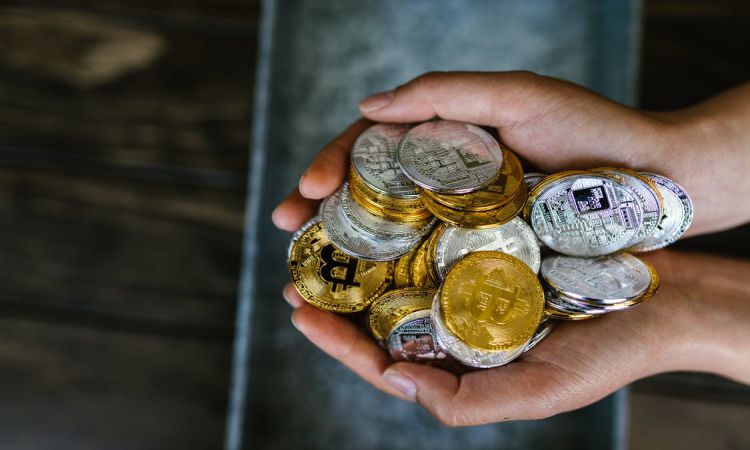 Cryptos are mere speculation, and their value can fluctuate dramatically. Bitcoin is a good example of this, as it has been known to drop 30% in one week before surging to new highs the following week. Bitcoin may be performing well in comparison to its early days of popularity, but the rewards are neither predictable nor secure. For the most part, cryptocurrency is also uninsured. If your bank fails, your checking and savings accounts are protected, but if your crypto exchange is hacked, fails, or disappears overnight, there is little you can do. Cryptocurrencies are full of oddities like this. There are a few essential tidbits that any potential investor should be aware of before getting into the crypto game, and if you do decide to invest in cryptocurrency, we recommend that you begin with a small portion of your portfolio.
Cryptos are mere speculation, and their value can fluctuate dramatically. Bitcoin is a good example of this, as it has been known to drop 30% in one week before surging to new highs the following week. Bitcoin may be performing well in comparison to its early days of popularity, but the rewards are neither predictable nor secure. For the most part, cryptocurrency is also uninsured. If your bank fails, your checking and savings accounts are protected, but if your crypto exchange is hacked, fails, or disappears overnight, there is little you can do. Cryptocurrencies are full of oddities like this. There are a few essential tidbits that any potential investor should be aware of before getting into the crypto game, and if you do decide to invest in cryptocurrency, we recommend that you begin with a small portion of your portfolio.
Table of Contents
On Buying Cryptocurrency
First, you must select a reputable cryptocurrency exchange. You’ll buy, sell, and most likely store your cryptocurrency on an exchange. Because cryptocurrency has been around for a long time, the largest exchanges have established strong and user-friendly features. If you are planning to trade but don’t have any idea yet on how to start, Dart Europe website is a reliable crypto media portal where you can find the latest cryptocurrency news and updates, price forecasts, and so forth.
For most newcomers, Coinbase, a publicly traded corporation with 73 million members, is a good place to start. The disadvantages include high fees and the inability to move your private key to a cold wallet. Another Binance competitor is Coinbase, which competes by offering lower costs, a broader selection of cryptocurrencies, and more complex services. Another factor to consider is that there are digital currencies other than Bitcoin available, with over 7,500 cryptos now in existence, and the majority of exchanges only offer a limited number of options.
Ethereum (ETH), for example, has become one of the most popular cryptocurrencies in terms of market capitalization thanks to blockchain-based smart contracts. Dogecoin (DOGE), on the other hand, has a market capitalization of $85 billion despite being found in less than two hours as a satirical take on Bitcoin, demonstrating the strength of speculative and online talk in the cryptocurrency market. There is also Binance Coin (BNB), which was created by Binance, the world’s largest cryptocurrency exchange, which has grown in popularity due to its widespread acceptance and potential to reduce Binance’s trading costs.
What are your best alternatives? Because cryptocurrencies are so speculative and volatile, deciding which ones to include in your portfolio may come down to personal preference, such as whether you believe Ethereum’s technology is superior to the alternative. You should also read their white paper. How much should you buy once you’ve decided on a cryptocurrency to invest in? The solution is straightforward: take small steps. Limit yourself to ten percent of your portfolio, or even five percent.
Monitoring and Preservation of Your Investments
It is critical that you decide where to keep your private keys once you have acquired some cryptocurrency. In a nutshell, hot and cold wallets exist both online and offline. More security mechanisms are protecting hot wallets than ever before, allowing you to access and exchange your cryptocurrency with confidence easily. However, as hackers become more daring, many cryptocurrency traders and long-term holders are opting to store their private keys in a cold wallet, a USB, or a hard drive that they keep in a safe. If you’re just getting started and want to buy small amounts on a regular basis, a hot wallet should suffice. Finally, you must keep your cryptocurrency investment active. The only way to go wrong at this stage is to buy crypto and then completely forget about it.
 It is critical to track your cryptocurrency’s performance over time by adding it to your main investment dashboard, and because crypto trading is still in its early stages, stay up to date on the news to see if your chosen exchange is under regulatory scrutiny. Keep an eye on whether countries are outlawing cryptocurrency or accepting it as legal tender. To learn more about the industry, you can also participate in cryptocurrency forums online or attend cryptocurrency conferences or meetings in person. It is critical that you stay up to date and continue to educate yourself on the latest developments in cryptos and blockchain technology.
It is critical to track your cryptocurrency’s performance over time by adding it to your main investment dashboard, and because crypto trading is still in its early stages, stay up to date on the news to see if your chosen exchange is under regulatory scrutiny. Keep an eye on whether countries are outlawing cryptocurrency or accepting it as legal tender. To learn more about the industry, you can also participate in cryptocurrency forums online or attend cryptocurrency conferences or meetings in person. It is critical that you stay up to date and continue to educate yourself on the latest developments in cryptos and blockchain technology.
 There Is No Need to Restrict Yourself to Digital Currency Exchanges
There Is No Need to Restrict Yourself to Digital Currency Exchanges
Investing in virtual currency does not even have to include the purchase of physical data encryption assets. There are several ways to invest in the cryptocurrency industry, including purchasing stock in companies that are heavily involved in virtual currency development.
Coinbase (COIN) shares, mining companies like Hut 8 Mining (HUT), or chipmakers like Nvidia (NVDA) that indirectly support crypto by creating mining chips, are all examples of companies that can be invested in that are related to cryptocurrency but not on actual crypto exchanges.
Aside from that, making investments in blockchain, the technology that underpins bitcoin, is an option for anyone looking to enter the market without purchasing any actual cryptocurrency. Two of the world’s largest publicly traded companies engaged in blockchain initiatives in 2014, and the number has now risen to 81. The Amplify Transformational Data Sharing ETF (BLOK) is one such fund that invests in both established companies and promising newcomers to the blockchain space.
The Final Decision Is in You
Making cryptocurrency investments has both advantages and disadvantages. You might be engaged in cryptocurrency if you’re searching for a way to expand your investment portfolio, or if you want to diversify your holdings even further by adding securities with a high level of risk. This type of investment is ideal for those who have assessed their risk tolerance and are actively seeking to increase the risk in their portfolio. If you believe in the goal of cryptocurrency and blockchain technology, you are willing to put your money where your mouth is. Otherwise, if you are wary of taking risks, you may decide not to invest in cryptocurrency. The risks, volatility, and unpredictability of cryptocurrency are enormous, and if that causes you more fear than joy, there may be a better match for your portfolio. You should also avoid it if this is your first time investing money. Before investing in cryptocurrency, it is recommended that you have $100,000 insecure assets. Purchasing and investing in cryptocurrency has never been easier. Although exciting, cryptocurrency isn’t for everyone; it’s still a Wild West gold rush with no governmental oversight. Before investing in cryptocurrency, keep an eye on the market and educate yourself on the risks and best practices.






